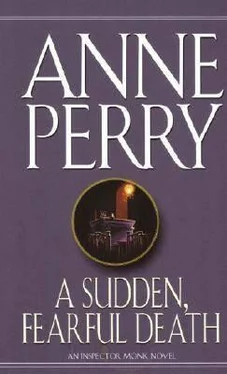"Lady Ross Gilbert," he began with a charming smile. "Prudence Barrymore was an excellent nurse, was she not? With far above the skills and abilities of the average?"
"Most certainly," she agreed. "She had considerable actual medical knowledge, I believe."
"And she was diligent in her duties?"
"Surely you must know this?"
"I do." Rathbone nodded. "It has already been testified to by several people. Why does it surprise you, then, that Sir Herbert should have chosen her to work with him in a large number of his surgical cases? Would that not be in the interest of his patients?"
"Yes-of course it would."
"You testified that you observed in Prudence the very recognizable signs of a woman in love. Did you observe any of these signs in Sir Herbert, when in Prudence's presence, or anticipating it?"
"No I did not," she replied without hesitation.
"Did you observe any change in his manner toward her, any departure from that which would be totally proper and usual between a dedicated surgeon and his best and most responsible nurse?"
She considered only a moment before replying. For the first time she looked across at Sir Herbert, just a glance, and away again.
"No-he was always as usual," she said to Rathbone. "Correct, dedicated to his work, and with little attention to people other than the patients, and of course the teaching of student doctors."
Rathbone smiled at her. He knew his smile was beautiful.
"I imagine men have been in love with you, possibly many men?"
She shrugged very slightly, a delicate gesture of amusement and concurrence.
"Had Sir Herbert treated you as he treated Prudence Barrymore, would you have supposed that he was in love with you? Or that he considered abandoning his wife and family, his home and reputation, in order to ask you to marry him?"
Her face lit with amusement.
"Good Heavens, no! It would be totally absurd. Of course not."
"Then for Prudence to imagine that he was in love with her was unrealistic, was it not? It was the belief of a woman who could not tell her dreams from reality?"
A shadow crossed her face, but it was impossible to read it.
"Yes-yes it was."
He had to press home the point.
"You said she had some medical skill, ma'am. Do you have any evidence that it was surgical skill of a degree where she was capable of performing amputations herself, unaided and successfully? Was she indeed not a mere nurse, but a surgeon?"
There was an unhappy murmur around the room and a confusion of emotions.
Berenice's eyebrows shot up.
"Good Heavens. Of course not! If you forgive me, Mr. Rathbone, you have no knowledge whatever of the medical world if you can ask such a question. A woman surgeon is absurd."
"Then in that respect also, she had lost the ability to distinguish between daydreams and reality?"
"If that is what she said, then most certainly she had. She was a nurse, a very good one, but certainly not a doctor of any sort. Poor creature, the war must have unhinged her. Perhaps we are at fault if we did not see it." She looked suitably remorseful.
"Perhaps the hardships she endured and the suffering she saw unbalanced her mind," Rathbone agreed. "And her wish to be able to help led her to imagine she could. We may never know." He shook his head. "It is a tragedy that such a fine and compassionate woman, with so intense a desire to heal, should have been strained beyond the point she could endure with safety to her own nature; and above all that she should end her life by such a means." He said that for the jury, not that it had any relevance to the evidence, but it was imperative to keep their sympathy. He had destroyed Prudence's reputation as a heroine; he must not take from her even the role of honorable victim.
Lovat-Smith's last witness was Monk.
He climbed the steps of the witness box stone-faced and turned to the court coldly. As before, he had caught snatches of what Rathbone had drawn from Berenice Ross Gilbert from those who were coming and going from the courtroom: press reporters, clerks, idlers. He was furious even before the first question.
"Mr. Monk," Lovat-Smith began carefully. He knew he had a hostile witness, but he also knew his evidence was incontestable. "You are no longer with the police force but undertake private inquiries, is that correct?"
"It is."
"Were you employed to inquire into the murder of Prudence Barrymore?"
"I was." Monk was not going to volunteer anything. Far from it losing the public's interest, they sensed antagonism and sat a little more upright in order not to miss a word or a look.
"By whom? Miss Barrymore's family?"
"By Lady Callandra Daviot."
In the dock Sir Herbert sat forward, his expression suddenly tense, a small vertical line between his brows.
"Was it in that capacity that you attended the funeral of Miss Barrymore?" Lovat-Smith pursued.
"No," Monk said tersely.
If Monk had hoped to disconcert Lovat-Smith, he succeeded only slightly. Some instinct, or some steel in Monk's face, warned him not to ask what his reason had been. He could not guarantee the answer. "But you were there?" he said instead, sidestepping the issue.
"I was."
"And Miss Barrymore's family knew your connection with the case?"
"Yes."
There was not a sound in the room now. Something of the rage in Monk, some power in his face, held the attention without a whisper or a movement.
"Did Miss Barrymore's sister, Mrs. Faith Barker, offer you some letters?" Lovat-Smith asked.
"Yes."
Lovat-Smith kept his evenness of expression and voice with difficulty.
"And you accepted them. What were they, Mr. Monk?"
"Letters from Prudence Barrymore to her sister," Monk replied. "In a form close to a diary, and written almost every day for the last three and a half months of her life."
"Did you read them?"
"Naturally."
Lovat-Smith produced a sheaf of papers and handed them up to Monk.
"Are these the letters Mrs. Barker gave you?"
Monk looked at them, although there was no need. He knew them immediately.
"They are."
"Would you read to the court the first one I have marked with a red ribbon, if you please?"
Obediently, in a tight hard voice, Monk read:
"My dearest Faith,
"What a marvelous day I have had! Sir Herbert performed splendidly. I could not take my eyes from his hands. Such skill is a thing of beauty in itself. And his explanations are so lucid I had not the slightest difficulty in following him and appreciating every point.
"He has said such things to me, I am singing inside with the sheer happiness of it All my dreams hang in the balance, and he has it all in his power. I never thought I should find anyone with the courage. Faith, he truly is a wonderful man-a visionary-a hero in the best sense-not rushing around conquering other peoples who should be left alone, or battling to discover the source of some river or other-but crusading here at home for the great principles which will help tens of thousands. I cannot tell you how happy and privileged I am that he has chosen me!
"Until next time, your loving sister,
Prudence."
"And the second one I have marked, if you will?" Lovat-Smith continued.
Again Monk read, and then looked up, no emotion in his eyes or his features. Only Rathbone knew him well enough to be aware of the revulsion inside him for the intrusion into the innermost thoughts of a woman he admired.
The room was in silence, every ear strained. The jury stared at Sir Herbert with undisguised distaste.
"Are the others in a similar vein, Mr. Monk?" Lovat-Smith asked.
"Some are," Monk replied. "Some are not."
"Finally, Mr. Monk, would you read the letter I have marked with a yellow ribbon."
In a low hard voice, Monk read:
Читать дальше












